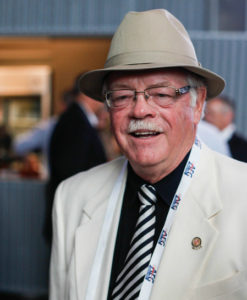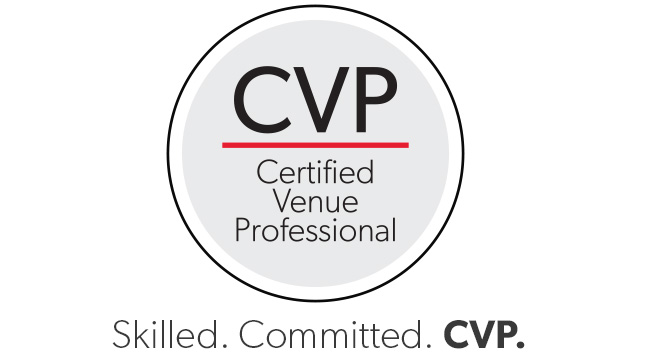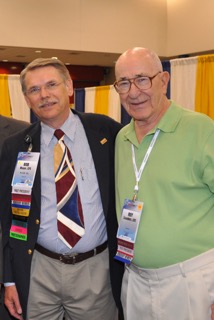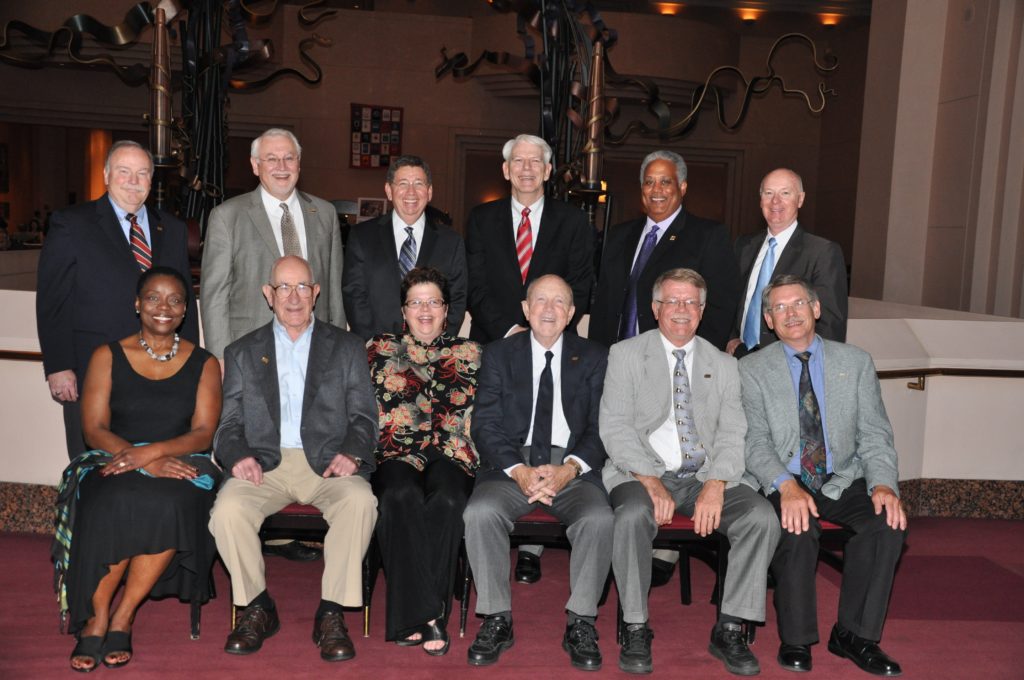Here’s an Easy Tip to Better Persuade Others

Lower your voice. That’s it. That’s the tip.
In a study conducted at the University of Illinois, females and males who lowered the pitch of their voices were rated as more influential than those who didn’t.
“And this approach ends up being effective in that, if you lower your voice, chances are you’ll probably be more effective at becoming leaders and influencing others, because it changes how others see you,” Joey Chang, a social psychologist at the University of Illinois, told Scientific American.
To learn more, please listen to the 60-Second Science podcast, “Lower Your Voice Pitch to Persuade.”
(Barry White Image: Álvaro Tajada Portalo/Creative Commons)
David Ross, CFE, Passes Away
 Former IAVM President David Ross, CFE, passed away last week after a long illness. He was 63 years old. The news brought forth many thoughts from IAVM leadership, current and past.
Former IAVM President David Ross, CFE, passed away last week after a long illness. He was 63 years old. The news brought forth many thoughts from IAVM leadership, current and past.
“What a wonderful person. I took the IAAM (IAVM) presidential gavel from David in San Antonio. He gave me a lot of advice during his term as president, and he told me to always carry a camera with me,” said Larry Perkins, CFE. “When I got to Hong Kong, Cliff Wallace had his chauffeur drive me all around and one of the first things I did was to buy a camera there, just like David’s. We all watched his kids grown up over the years as David and Sue attended the conference as a family. It was very nice to see and it was an inspiration to me as well.”
David joined the International Association of Auditorium Managers (IAAM, now called the International Association of Venue Managers) in 1985. He served as president of the board of IAAM in 2005-06, DAL-Universities in 1996 and again in 2001-03, District 3 vice president from 1997-99, a member of the IAAM Foundation Board of Trustees, Board of Regents, Board of Governors, Oglebay Alumni Association, and International Steering Committee. He has chaired the Budget and Finance Committee, Annual Conference Planning Committee, Nominating Committee, History & Awards Committee, and Bylaws Committee. He spent a total of nine years on the board of directors. David graduated from Public Assembly Facility Management School (now called Venue Management School) at Oglebay in 1993. He also earned his CFE in 1993. David graduated from the Senior Executive Symposium in 2006.
“David and I served together for many years on various IAVM boards and committees. He was passionate about our industry and we did not always agree on every issue,” said Jimmy Earl, CFE. “Moreover, David had a way of making it a win-win situation for all and was always highly prepared. The best time I remember with him was in Chattanooga for association business and David invited me to his childhood home for a visit. We had a wonderful southern meal and great fellowship and a great time and I got to know him just a little better. I mention that because the only other thing that was more important to him than his career was his family. He was totally devoted to Sue and the kids. Rest in peace my friend. We will miss you.”
During his presidency, he reacted quickly following the devastating Hurricanes Katrina and Wilma with the commissioning of the Mega Shelters Best Practices Guidelines. His appointment of Greg Davis, director of the Cajundome in Lafayette, Louisiana, and the other committee members of the Task Force to lead this initiative proved to be a major accomplishment and benefit to the association’s membership and to the industry.
“David worked diligently to make IAVM the best that it could be — as a district VP, board member, and president,” said Steve Peters. “But I think his greatest gift to our industry was the way he greeted everyone he met with his warm smile, his gentle manner, and slow, gravelly southern drawl. Dave never met a stranger. Many, many people working in our industry today owe their start to this kind, gentle man.”
Todd Hunt, CFE, first met David in 1992 when he interviewed for a position at the Show Me Center in Missouri.
“He was wise enough not to hire me for a job I wasn’t qualified for, and that became a running joke between us for the past 24 years,” Hunt said. “As managers of small market venues, we bonded often over issues we both faced. His passion for the industry and for IAVM will be missed but his friendship will be missed even more.”
David was also instrumental in securing the VMA Affiliation Agreement in 2007.
“He will always be remembered for successfully negotiating an affiliation agreement between IAVM and the Venue Management Association, expanding a global membership within Australasia,” said John Siehl, CFE. “I also remember David being instrumental in the continuation of the archival history of IAAM and IAVM, working diligently to ensure document collection, date preservation and capturing video testimonial clips and stories from members.”
David was awarded the Charles A. McElravy Award, our industry’s highest honor, in 2010. He is survived by his wife, Susan; his daughter, Erin; his son, Bryan and Bryan’s wife Jennifer; and their son and David’s grandson, Owen.
“David never met a man (a person) he didn’t like,” said Dexter King, CFE. “He was always so engaging, no matter who you were, expressing his personal interest—in what you were saying, what your situation was, how you were doing. Warm and friendly in a disarming manner, he made instant friends of total strangers.”
(Image: Orange Photography)
Congratulations to Our Latest CVP

Congratulations to the following individual who was recently awarded the Certified Venue Professional (CVP) designation.
Thanks to the generous funding and support from the IAVM Foundation, the CVP program was launched in August 2015 at VenueConnect in Baltimore. It recognizes the competence of middle-to-senior-level managers of public assembly venues as well as assisting the managers in creating a professional roadmap in the venue industry.
The CVP designation says three important things about an individual: he or she is a capable professional, is committed to the industry, and is pledged to continued professional growth and development. Venue professionals who earn the CVP designation are recognized, by those inside and outside the industry, as skilled in their profession.
 John Marquardt, CVP
John Marquardt, CVP
Assistant Director for Event Management
State Farm Center, University of Illinois Athletics
Champaign, Illinois
ParkHub and VenueNext Agree to Partnership

Exciting times in the parking management world—ParkHub and VenueNext agreed to officially partner after successful tests during events at Levi’s Stadium in Santa Clara, California, last year.
“Our primary goal is to give fans a better experience, and getting them to the stadium and parked as efficiently as possible is a big part of that,” said Jim Mercurio, vice president of stadium ops and general manager of Levi’s Stadium, in a statement. “Working with ParkHub is another way we can enable each individual fan to customize their experience by enabling parking lot attendants to accept payments and validate QR/bar codes from pre-purchased parking reservations, all while speeding up the process for parking customers.”
VenueNext’s mission is to transform venue experiences by tying isolated systems in a venue together and presenting these experiences to guests in a seamless mobile interface, said John Paul, CEO and founder of VenueNext.
“Integrating with an innovative and complete parking management company like ParkHub gives guests an even better mobile parking experience and the large venue owner a more comprehensive real-time data view of everything parking related during that event, Paul said in a statement. “We look forward to working together to take this added benefit to other venues.”
According to a press release, ParkHub’s parking management system enhances the VenueNext platform by feeding real-time information about parking inventory, transactions, and traffic flow into the VenueNext dashboard. This gives venue operators more control of the guest experience.
“We’re excited to extend our reach through this partnership with VenueNext,” said George Baker, Sr., CEO and founder of ParkHub, in a statement. “We want to take the pain out of parking with our multiple products and API driven Platform approach for connecting various parking systems to fulfill our commitment of providing the guest with just what they need, the exact moment they need it – starting in the parking lots.”
(Image: Facebook)
Remembering Roy Saunders, CFE, 1930-2016

Bob C. Mayer, CFE, and Roy Saunders, CFE
A piece of Tulsa history passes on with Roy Saunders, CFE. If you’ve ever attended a rock concert, hockey game, circus, trade show, the ballet, opera, or symphony in Tulsa, then chances are you were in one of “Roy’s buildings.” As director of public events for the City of Tulsa for over three decades, Roy oversaw the construction, opening, and operation of The Tulsa Convention and Assembly Center (now the Cox Center) and The Tulsa Performing Arts Center, from 1962-1993. He worked tirelessly with eight mayoral administrations, the CVB, the chamber of commerce, the arts and humanities council, numerous national promoters, and Carson Attractions, to bring business and top-name entertainment events to his beloved Tulsa.
“It was an honor and a privilege for me to work for Roy Saunders for 10 years before his retirement in 1993 as director of public events for the City of Tulsa,” said Bob C. Mayer, CFE, past IAVM president. “He instilled in me a passion for the industry and for the association that he loved so much. I learned so much about managing public assembly venues from Roy and his protégé in Oklahoma City, Dan Saunders (no relation), who I worked for before moving to Tulsa.”
Roy was born in Fayetteville, Arkansas, August 20, 1930, to Bonnie and Sydney Saunders. The family later moved to Pratt, Kansas, where Roy graduated from Pratt High School in 1948. He proudly served in the United States Army as a finance officer from 1948 to 1952 during the occupation of Germany. Roy then returned to Kansas and started college. He met the love of his life when he and Joyce Smith were cast as the two leads in their college’s theater production of My Little Margie. The couple married in 1955 and moved to Topeka, Kansas. Roy graduated with honors in 1957, earning a degree in business administration from Washburn University.
Saunders was a long-time member of the International Association of Auditorium Managers (IAAM, now called IAVM), joining in 1957. Roy served in numerous capacities and held every office within the association. His influence as a leader, mentor, and friend to the membership spanned seven decades. Saunders is the only person in IAAM/IAVM history to be the recipient of the IAAM Mr. Auditorium Manager award, the Charles A McElravy award (the industry’s highest honor), and serve as IAAM president. Roy saw a need for top-level training for entertainment venue executives and helped conceive and found the Venue Management School (formerly Public Assembly Facility Management School) in 1987.
“It seemed that Roy mentored just about everyone that he came in contact with and would share his expertise and/or opinion on about any topic,” Mayer said. “He always enjoyed meeting new members of IAVM and wouldn’t hesitate in making them feel comfortable and would always offer to help them learn about the profession. He was certainly instrumental in helping to launch new educational offerings for the industry, including the Venue Management School at Oglebay Park in Wheeling, WV.”
Roy and Joyce celebrated their 61st wedding anniversary on March 5. The couple loved to travel and visited more than 50 countries on six continents and all 50 of the United States. Roy loved adventure. He was an avid fan of all types of auto racing and was himself a stock car driver. He enjoyed water skiing, trick skiing, hunting, fishing, woodworking, and could build just about anything.

Roy Saunders, CFE, and past IAVM presidents.
Roy was beloved by his family, friends, neighbors, and professional associates. He was noted for his ever-present sense of humor. Roy was a great storyteller who always had a twinkle in his eye and a good joke up his sleeve. He was never happier than when he was holding court at the dining room table, with family all around, dispensing sage advice and regaling people with stories of past adventures, some of which were still funny after the eighth or ninth telling. He was a long-time volunteer at Hillcrest Medical Center, and was very proud of his Cherokee heritage.
“As anyone knows who ever met Roy, he was a great storyteller,” Mayer said. “He had an unbelievable memory for dates and events and a wonderful historical perspective that came out in the stories that he told. Each one included a teachable kernel that you could learn something from.”
Roy is survived by his wife, Joyce; son Greg and wife Debbie of Tulsa; daughter Dawn Black and husband Dusty of Austin, Texas; and grandchildren Gabrielle, Ford, Bella, and Luke.
In lieu of flowers, the family would appreciate donations to the American Cancer Society, or honoring a Veteran by picking up his or her lunch tab.
Memorial service to be held 2 p.m. on Friday, April 22, at Ninde’s Brookside Chapel in Tulsa, Oklahoma.
“Roy’s strength of character, incredible wit, great sense of humor, passion for his profession, and devotion to his many friends will be missed by everyone who knew him,” Mayer said. “Rest in peace, Roy.”
(Images: Bob C. Mayer, CFE)
Do you want to receive a Front Row News weekly digest?
Categories
- Allied (861)
- Architecture (147)
- Arenas (747)
- Career (897)
- Convention Centers (895)
- Education (623)
- Events (1,544)
- Food & Beverage (193)
- Foundation (113)
- Guest Experience (1,496)
- Industry News (2,270)
- Leadership (1,888)
- Marketing (150)
- Membership (2,000)
- Music (213)
- Performing Arts Centers (454)
- Professional Development (409)
- Research (127)
- Safety & Security (442)
- Sports (763)
- Stadiums (608)
- Student (159)
- Technology (516)
- Ticketing (92)
- Touring (82)
- Trends (364)
- Uncategorized (741)
- Universities (218)
- Video (25)
- Young Professional (198)
Twitter Feed
- Twitter feed loading
Recent Posts
- Peggy Daidakis Humbly Made Convention Center History
- Welcome to Our Newest Members
- New Member Benefit! IAVM Partners with Advantage Training to Elevate Staff Readiness and Guest Experience
- Charlotte Convention Center Welcomes Two New Leaders to its Management Team
- Fort Worth Cuts Ribbon on Phase 1 of Convention Center Expansion
Categories
- Allied
- Architecture
- Arenas
- Career
- Convention Centers
- Education
- Events
- Food & Beverage
- Foundation
- Guest Experience
- Industry News
- Leadership
- Marketing
- Membership
- Music
- Performing Arts Centers
- Professional Development
- Research
- Safety & Security
- Sports
- Stadiums
- Student
- Technology
- Ticketing
- Touring
- Trends
- Uncategorized
- Universities
- Video
- Young Professional
Archives
- December 2025
- November 2025
- October 2025
- September 2025
- August 2025
- July 2025
- June 2025
- May 2025
- April 2025
- March 2025
- February 2025
- January 2025
- December 2024
- November 2024
- October 2024
- September 2024
- August 2024
- July 2024
- June 2024
- May 2024
- April 2024
- March 2024
- February 2024
- January 2024
- December 2023
- November 2023
- October 2023
- September 2023
- August 2023
- July 2023
- June 2023
- May 2023
- April 2023
- March 2023
- February 2023
- January 2023
- December 2022
- November 2022
- October 2022
- September 2022
- August 2022
- July 2022
- June 2022
- May 2022
- April 2022
- March 2022
- February 2022
- January 2022
- December 2021
- November 2021
- October 2021
- September 2021
- August 2021
- July 2021
- June 2021
- May 2021
- April 2021
- March 2021
- February 2021
- January 2021
- December 2020
- November 2020
- October 2020
- September 2020
- August 2020
- July 2020
- June 2020
- May 2020
- April 2020
- March 2020
- February 2020
- January 2020
- December 2019
- November 2019
- October 2019
- September 2019
- August 2019
- July 2019
- June 2019
- May 2019
- April 2019
- March 2019
- February 2019
- January 2019
- December 2018
- November 2018
- October 2018
- September 2018
- August 2018
- July 2018
- June 2018
- May 2018
- April 2018
- March 2018
- February 2018
- January 2018
- December 2017
- November 2017
- October 2017
- September 2017
- August 2017
- July 2017
- June 2017
- May 2017
- April 2017
- March 2017
- February 2017
- January 2017
- December 2016
- November 2016
- October 2016
- September 2016
- August 2016
- July 2016
- June 2016
- May 2016
- April 2016
- March 2016
- February 2016
- January 2016
- December 2015
- November 2015
- October 2015
- September 2015
- August 2015
- July 2015
- June 2015
- May 2015
- April 2015
- March 2015
- February 2015
- January 2015
- December 2014
- November 2014
- October 2014
- September 2014
- August 2014
- July 2014
- June 2014
- May 2014
- April 2014
- March 2014
- February 2014
- January 2014
- December 2013
- November 2013
- October 2013
- September 2013
- August 2013
- July 2013
- June 2013
- May 2013
- April 2013
- March 2013
- February 2013
- January 2013
- May 2012
- March 2012
- December 2011
- November 2011
- October 2011
Recent Comments
- Frank Bradshaw, Ph.D., CVE on John Meyer, CVE, a Tireless Advocate of Certification for Venue Professionals, Has Died
- Neil Sulkes on Hilary Hartung, Friend to Many in Venue Marketing, Has Left Us
- Jason Parker, CVE on The Devastation of Hurricane Helene and How We Can Support One Another
- Larry Perkins on Touhey Testifies Against Speculative Ticketing Before Congressional Subcommittee
- Peter Secord on Major Players for Planned Elkhart Amphitheater Were in the Mix at VenueConnect
